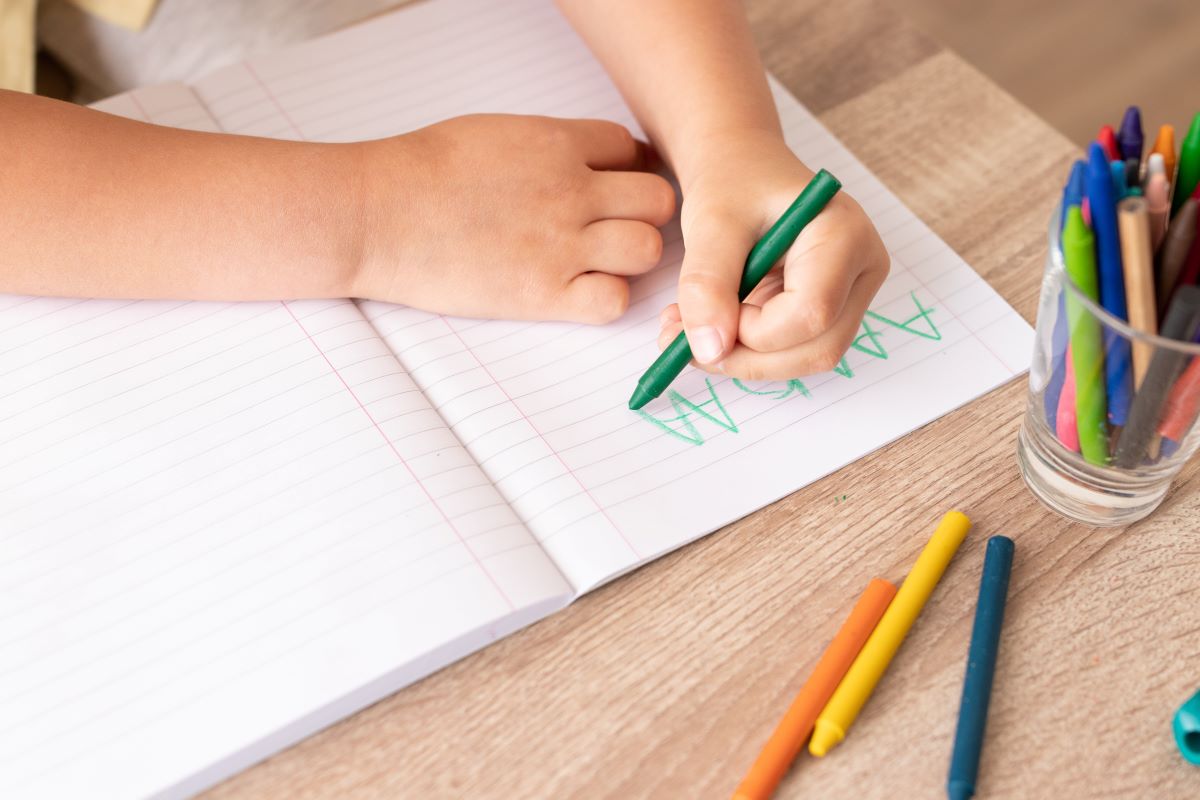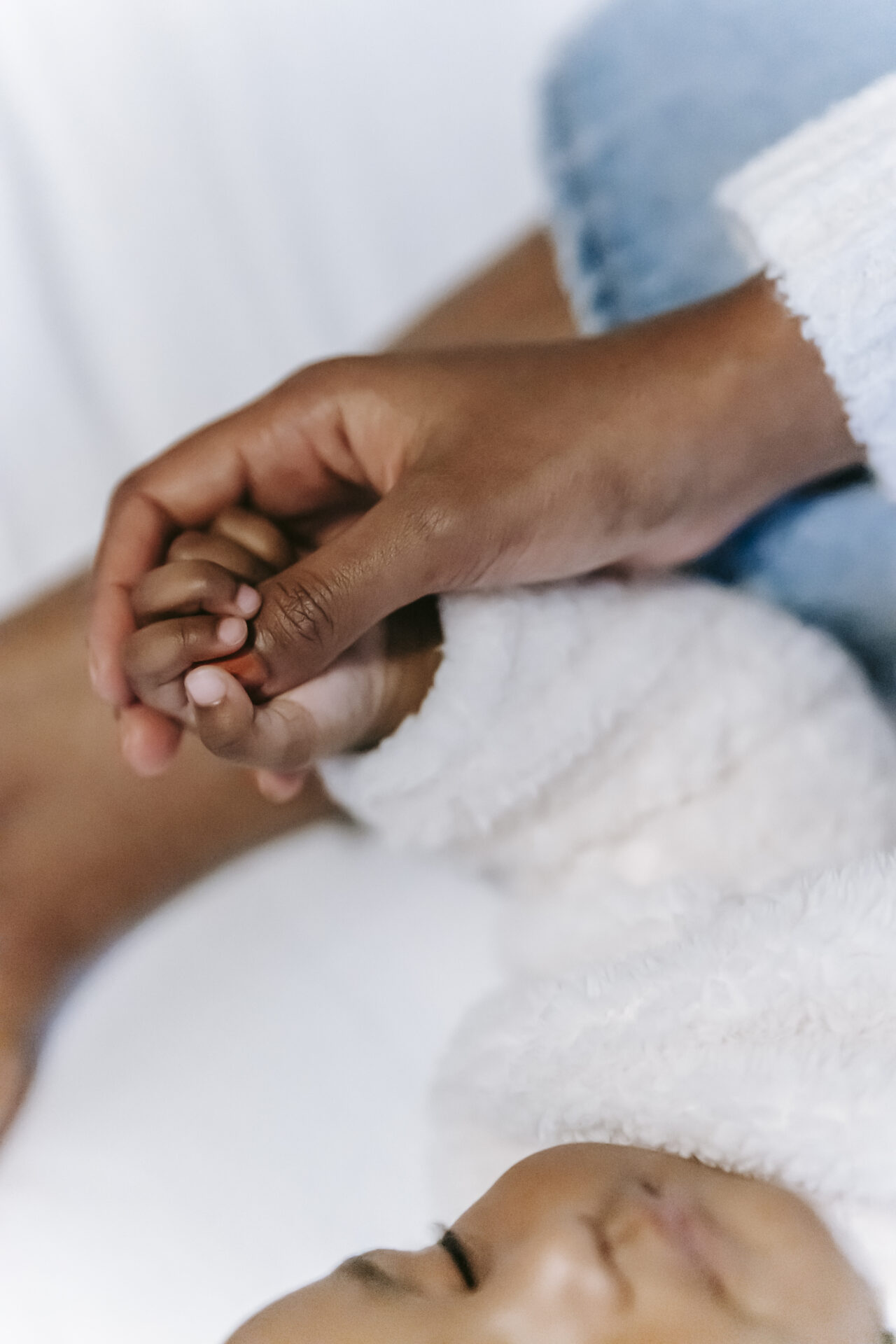Do you want to know how far the embryo has developed in the 6th week of gestation? We will tell you that and much more in this article. Find out which hormone triggers emotional chaos in you now.
Table of contents
This happens with you
Your body is fully focused on your pregnancy. The pregnancy hormone hCG increases in your blood and urine.
The hormone progesterone is responsible for relaxing the muscles in your abdomen. This ensures that the embryo is soft and comfortable.
Your hormones are working at full speed and will often turn your everyday life into a roller coaster ride of emotions.
Important facts about the 6th week of gestation: What you should know
In the 6th week of pregnancy, you may have already noticed the first signs of pregnancy. Now it is important that you pay attention to a healthy lifestyle. A healthy and balanced diet is important for you and your baby.
Alcohol and nicotine are taboo. These harmful substances can already cause considerable damage. Alcohol consumption during pregnancy can cause fetal alcohol syndrome (FAS) in your baby.
We advise you to start looking for a midwife now. Lists of midwives are available in doctors’ offices, for example. Alternatively, you can look for a lesser midwife on the Internet
Tip for fathers-to-be
Even if the time after the confirmation of the pregnancy is very exciting for you: Try to radiate calmness towards your wife and be her rock. Talk to her about worries and fears and solve the problems together.
Signs of pregnancy in the 6th week of pregnancy
Your body has to get used to the new life in your belly and reacts with signs and symptoms to your pregnancy. In most cases you will feel nausea and tiredness.
These symptoms also have a benefit: Your body slows down its functions to protect the little embryo. Complaints such as listlessness, bloating, constipation and other symptoms are completely normal.
To give you an overview of the symptoms of your pregnancy, we have summarized them for you at a glance.
Also interesting:
Period remains off
For most women, the absence of a period is a fairly sure sign of a possible pregnancy. Light bleeding can also occur during pregnancy. So-called spotting.
In most cases,spotting is caused by the implantation of the egg in the uterus. However, this is only light bleeding.
Caution: If you experience pain or heavier bleeding, you should contact your doctor immediately.
Your breasts change
Do your breasts feel a little taut? Are they particularly sensitive to touch? Have they become slightly larger or swollen? Hormones are responsible for this. As the mammary glands grow, so do the breasts – which is why your bra suddenly fits tighter than normal.
Don’t worry, this uncomfortable feeling will disappear as soon as your body gets used to the hormonal change. A pregnancy bra or one size larger helps to avoid tension, which can also prevent back pain.
Fatigue
Feeling tired and sluggish? While you are pregnant, your hormone levels change. Your body increases its blood volume, blood sugar level and metabolism adjusts.
Your body is working overtime to support the placenta. The placenta is responsible for ensuring that your baby receives vital nutrients and oxygen. Light exercise such as long walks, bike rides or yoga helps against fatigue.
Fight nausea
Nausea – probably the best-known pregnancy symptom. Most often, nausea occurs in the morning, which is why it is usually referred to as morning sickness. Unfortunately, this malaise and also vomiting usually lasts until the end of the 1st trimester
Small snacks such as crispbread, rusks or salt sticks can help against the symptoms. In general, it is better to eat many small meals rather than one large one. Acidic drinks also promote nausea and should also be avoided.
Many women also find that they can’t stand some of their beloved foods and drinks at all – they report a metallic taste. This can vary from woman to woman.
Strong urge to urinate
Need to go to the bathroom more often lately? From around the 6th week of pregnancy, you may notice an increased urge to urinate. This is due to the fact that your uterus is getting bigger and the pressure on your bladder is increasing.
In addition, the hormone progesterone has a relaxing effect on your bladder. The increased blood flow ensures higher kidney activity. From the 2nd trimester onwards, this discomfort will subside as the uterus moves towards the abdomen and thus no longer presses so hard on the bladder.
Mood swings
Mood swings can also be an indication of pregnancy. Due to the change in hormones in your body, sudden outbursts of tears or mood highs are not uncommon
Cravings
You suddenly have a craving for something salty, although you actually only like to eat chocolate? Or do you suddenly feel sick when you eat certain foods? The hormonal changes during your pregnancy are also responsible for this. Eat what you like – just make sure you eat a balanced and healthy diet.
Positive pregnancy test
Of course, probably the best sign of pregnancy is a positive pregnancy test. Pregnancy can be detected in the urine from the 2nd day after the absence of the period.
Of course, such a test can also be wrong. If the hCG level in your body is too low, the test will show “negative”. To be sure, you should have the pregnancy confirmed by your gynecologist.
Abdominal pain
Abdominal pain, stinging in the abdomen, which feels like period pain, are typical symptoms of early pregnancy. Many organs are affected by the growing uterus, which can lead to pain in the stomach region.
What can be seen on the ultrasound in the 6th WOP
The 6th week of pregnancy is an exciting time for you: From the 6th week, you can clearly see the embryo on the ultrasound image.
The embryo can be seen in the 6th week as a small worm about 2 to 4 mm long. You can already see the arm and leg structures on the ultrasound image.
The pulse in the blood vessels of the umbilical cord is also already recognizable
Ectopic pregnancy and the risks
If the fertilized egg does not nest in the uterus but in the fallopian tube, this can be dangerous for both the baby and the mother. The fallopian tube is not flexible enough for a growing baby and does not have enough capacity – which is why sooner or later ruptures will occur, causing internal bleeding.
However,ectopic pregnancies are not a cause for concern: they can be treated by surgery or medication, usually without permanent damage to the fallopian tubes and ovaries.
So, if your pregnancy is confirmed, you should see a doctor as soon as possible to rule out or treat an ectopic, ectopic or ovarian pregnancy. EUG (extrauterine pregnancy) can be recognized by the fact that no amniotic cavity is visible on the ultrasound.
What is the risk of miscarriage in the 6th week of pregnancy?
The first 12 weeks of pregnancy are considered particularly delicate. During this time, external influences, e.g. too much stress, can cause a miscarriage to occur.
From the 6th to the 8th week of pregnancy, the risk of miscarriage is about 18%. From the 17th week of gestation, the risk drops significantly to 2 to 3 %. As you can see, the more advanced the pregnancy, the lower the risk of miscarriage.
On the basis of these figures, we would like to ease your worries on the one hand, and on the other hand we would like to show you that you are not alone. The most important thing is to talk about it. This is the only way you can come to terms with what has happened.
In addition to your partner, family or friends, you can also seek professional help in the event of a miscarriage.
Signs of a miscarriage
There are some signs that can indicate that something is wrong. So that you know all the alarming signs, we have summarized them for you here:
- Bleeding*
- Severe pain in the lower abdomen
- Pulling in the lower abdomen
- Pain in the lower back
- Fever and purulent discharge
- Leakage of amniotic fluid
*Bleeding does not necessarily indicate a miscarriage. Bleeding can easily occur during implantation, as tiny blood vessels are injured in the process. Do not worry, this is completely normal.
If you experienceheavy or painful bleeding, you should report it to your doctor as soon as possible or go to the nearest hospital.
Risk factors for miscarriage
Although a miscarriage cannot be absolutely avoided, there are some risks that you should be aware of. Below we have listed all the risk factors that can lead to a miscarriage.
- Smoking and alcohol
- Excessive consumption of caffeine (more than 3 cups of coffee per day)
- Uterine malformations
- An autoimmune disease of the mother
- Untreated chronic kidney or thyroid disease
- Infections of the mother at the beginning of pregnancy
- Advanced age of the mother
What happens to the baby
6. WOP: The heart of the embryo begins to beat
In the 6th week of gestation, the embryo is about 2 to 4 mm in size. By the end of the 5th week, the neural tube has already formed, at the end of which a preliminary stage of the brain is already growing. This will later take over all functions and create the baby’s consciousness.
A milestone: The embryo’s heart chambers have developed and the little heart begins to beat in the 6th week. It beats twice as fast as yours. Did you know? The rhythm of the heart reveals a lot about the well-being of the little embryo.
The placenta is also already connected to its abdomen. Under an ultrasound, you can even see the beating of the little heart. Now, in the 6th WOP, the spinal cord will develop. This will later become the spinal column.
At one end of the dorsal cord, the legs develop, which at this point still look like little wings. Next to the neck and head, the first signs of the eyes, ears and brain can already be seen.
Since the embryo always develops from top to bottom, the head of the little creature also appears too large for the embryo.
It certainly seems unbelievable at the time, but the baby will continue to develop and increase in weight and size throughout the pregnancy. In most cases, an ultrasound image is not yet taken in the 6th week of pregnancy, but the gynecologist determines in the initial examination whether everything is going properly and palpates your abdomen.
You will receive a maternity passport in which all important data will be noted and which you should always carry with you
Usually there are 3 major examinations with ultrasound:
The first usually between the 9th WOP and 12th WOP, the second from the 19th WOP to 22nd WOP and the last major main examination between the 29th WOP and 32nd
This is important now
How you can support your body in the 6th week of pregnancy
Folic acid is particularly important for the development of the embryo in the 6th week of gestation. This is contained in foods such as carrots, beans, fish and tomatoes.
However, these foods can hardly cover the need for folic acid – therefore the additional intake of folic acid supplements is advisable. During pregnancy, you should take about 0.4 mg daily.
Folic acid ensures proper development of the embryo’s nerves. Take care of a healthy lifestyle by avoiding nicotine, alcohol and medications. Take enough vitamins to strengthen your immune system.
Pregnancy presents your body with great challenges. It is all the better if you support it. How you can best do that, we explain in this section.
The right diet
Make sure you eat these foods regularly:
- Vegetables
- Fruit
- Whole grain products
- Milk
- Dairy products
- Low fat meat
- Fish
Important nutrients such as protein, folic acid and magnesium support your baby’s development. So you know for sure that your baby receives valuable nutrients during your pregnancy.
Sports
Typical pregnancy complaints, such as back pain, do not yet occur during the 6th week of pregnancy. However, you can already prevent them now.
Light sports – such as yoga, swimming or cycling are recommended by doctors and midwives and are completely safe.
Caution: In the first 3 months of pregnancy, the risk of miscarriage is relatively high. Talk to your doctor about which sports you can do without any worries.
Midwife tip
In the 6th week of pregnancy I advise you to pay attention to healthy nutrition and a lot of relaxation. Try to avoid stress as much as possible and look forward to the exciting time ahead.
Also, see a gynecologist or midwife now at the latest to ensure that the pregnancy goes well.
FAQ
In the 6th week of pregnancy, the embryo’s little heart begins to beat for the first time. The heart beats twice as fast as yours.
The embryo is about 2 to 4 mm in size in the 6th week of gestation.
The ultrasound in the 6th week of pregnancy already shows the beginnings of legs and arms.
A miscarriage in the 6th week of pregnancy can be manifested by these signs: Bleeding, severe pain in the lower abdomen, pulling in the lower abdomen, pain in the lower back, fever and purulent discharge, leakage of amniotic fluid.
If you have these symptoms, inform your doctor immediately or go to the nearest hospital.
In the 6th week of pregnancy, the hCG level is between 500 and 10,000 U/L (units per litre).
For comparison: pregnancy tests can sometimes detect a pregnancy from as little as 10 U/L.
WOP 6 videos
Learn more about early pregnancy symptoms and the 6th week of pregnancy in Nekole and Charlotte’s videos.









